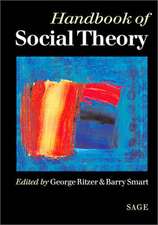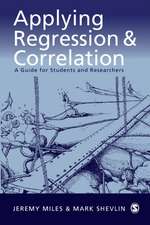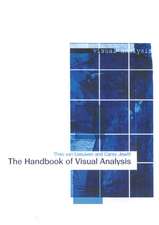Introduction to the Social Sciences (RLE Social Theory): Routledge Library Editions: Social Theory
Autor Maurice Duverger Traducere de Malcolm Andersonen Limba Engleză Paperback – 20 mai 2016
The techniques of observation used by social scientists are dealt with in some detail and the unity of the social sciences is illustrated by examples of the universal application of these techniques. Documentary evidence in its various forms are described along with the basic analytical techniques, including quantitative methods and content analysis. Other methods of gathering information through polls, interviews, attitude scales and participant observation are all described.
Professor Duverger brings together the different kinds of analysis used to assess the information thus gathered. Arguing that observing and theorizing are not two different stages or levels of research, he examines the practical value and difficulties of general sociological theories, partial theories and models and working hypotheses. He both describes and assesses the limitations of experiment and the scope of comparative methods in the social sciences. He then gives elementary instructions for using and assessing the value of mathematical techniques. The possibilities of presenting social phenomena through graphs and charts are also explored. There are useful book lists and diagrams.
| Toate formatele și edițiile | Preț | Express |
|---|---|---|
| Paperback (1) | 184.81 lei 43-57 zile | |
| Taylor & Francis – 20 mai 2016 | 184.81 lei 43-57 zile | |
| Hardback (1) | 527.64 lei 43-57 zile | |
| Taylor & Francis – 8 aug 2014 | 527.64 lei 43-57 zile |
Din seria Routledge Library Editions: Social Theory
-
 Preț: 288.80 lei
Preț: 288.80 lei -
 Preț: 341.55 lei
Preț: 341.55 lei - 55%
 Preț: 658.96 lei
Preț: 658.96 lei - 34%
 Preț: 623.81 lei
Preț: 623.81 lei - 34%
 Preț: 764.20 lei
Preț: 764.20 lei - 34%
 Preț: 652.62 lei
Preț: 652.62 lei - 15%
 Preț: 611.89 lei
Preț: 611.89 lei - 34%
 Preț: 765.01 lei
Preț: 765.01 lei - 18%
 Preț: 847.16 lei
Preț: 847.16 lei - 34%
 Preț: 624.60 lei
Preț: 624.60 lei - 34%
 Preț: 822.34 lei
Preț: 822.34 lei - 34%
 Preț: 850.99 lei
Preț: 850.99 lei - 34%
 Preț: 679.92 lei
Preț: 679.92 lei - 34%
 Preț: 678.28 lei
Preț: 678.28 lei - 34%
 Preț: 765.43 lei
Preț: 765.43 lei - 15%
 Preț: 555.94 lei
Preț: 555.94 lei - 33%
 Preț: 498.99 lei
Preț: 498.99 lei - 34%
 Preț: 624.60 lei
Preț: 624.60 lei - 34%
 Preț: 680.31 lei
Preț: 680.31 lei - 34%
 Preț: 765.01 lei
Preț: 765.01 lei - 22%
 Preț: 311.93 lei
Preț: 311.93 lei - 34%
 Preț: 624.60 lei
Preț: 624.60 lei - 18%
 Preț: 888.99 lei
Preț: 888.99 lei - 34%
 Preț: 624.21 lei
Preț: 624.21 lei - 18%
 Preț: 1005.80 lei
Preț: 1005.80 lei - 34%
 Preț: 765.84 lei
Preț: 765.84 lei - 34%
 Preț: 823.99 lei
Preț: 823.99 lei -
 Preț: 330.87 lei
Preț: 330.87 lei - 34%
 Preț: 622.99 lei
Preț: 622.99 lei - 18%
 Preț: 1060.25 lei
Preț: 1060.25 lei - 34%
 Preț: 678.69 lei
Preț: 678.69 lei - 18%
 Preț: 886.63 lei
Preț: 886.63 lei - 39%
 Preț: 678.30 lei
Preț: 678.30 lei - 34%
 Preț: 623.81 lei
Preț: 623.81 lei - 34%
 Preț: 682.65 lei
Preț: 682.65 lei - 31%
 Preț: 454.52 lei
Preț: 454.52 lei - 34%
 Preț: 765.43 lei
Preț: 765.43 lei - 25%
 Preț: 277.11 lei
Preț: 277.11 lei - 34%
 Preț: 763.78 lei
Preț: 763.78 lei - 33%
 Preț: 554.64 lei
Preț: 554.64 lei - 34%
 Preț: 680.73 lei
Preț: 680.73 lei - 34%
 Preț: 764.62 lei
Preț: 764.62 lei - 34%
 Preț: 991.80 lei
Preț: 991.80 lei - 34%
 Preț: 763.78 lei
Preț: 763.78 lei - 34%
 Preț: 622.59 lei
Preț: 622.59 lei - 34%
 Preț: 764.62 lei
Preț: 764.62 lei - 18%
 Preț: 1059.45 lei
Preț: 1059.45 lei - 18%
 Preț: 1000.27 lei
Preț: 1000.27 lei
Preț: 184.81 lei
Preț vechi: 223.26 lei
-17% Nou
Puncte Express: 277
Preț estimativ în valută:
35.36€ • 37.02$ • 29.43£
35.36€ • 37.02$ • 29.43£
Carte tipărită la comandă
Livrare economică 31 martie-14 aprilie
Preluare comenzi: 021 569.72.76
Specificații
ISBN-13: 9781138992641
ISBN-10: 113899264X
Pagini: 342
Dimensiuni: 156 x 234 mm
Greutate: 0.45 kg
Ediția:1
Editura: Taylor & Francis
Colecția Routledge
Seria Routledge Library Editions: Social Theory
Locul publicării:Oxford, United Kingdom
ISBN-10: 113899264X
Pagini: 342
Dimensiuni: 156 x 234 mm
Greutate: 0.45 kg
Ediția:1
Editura: Taylor & Francis
Colecția Routledge
Seria Routledge Library Editions: Social Theory
Locul publicării:Oxford, United Kingdom
Cuprins
Introduction: The Social Sciences 1. The Idea of Social Science 2. The Various Social Sciences Part 1: The Techniques of Observation 1. Documentary Observation 1.1. Categories of Documents 1.2. Methods of Analysing Documents 1.3. Technique of Content Analysis 2. Direct Extensive Observation 2.1. Sampling 2.2. Questionnaire Methods 2.3. The Results of Investigations 3. Direct Intensive Observation 3.1. Interviews 3.2. Tests and the Measurement of Attitudes 3.3. Participant Observation Part 2: Systematic Analysis 1. Elements of Systematic Analysis 1.1. Conceptual Frameworks for Research 1.2. Research 1.3. The Comparative Method 2. Mathematical and Graph Techniques 2.1. Mathematical Techniques 2.2. Graphs
Notă biografică
Maurice Duverger, Malcolm Andersen
Descriere
Professor Duverger at last provides the student with an overall view of the methodology of the social sciences. He briefly traces the origin of the notion of a social science, showing how it emerged from social philosophy. Its essential elements and pre-conditions are described; the splintering of social science into specialist disciplines is explained, and the need for a general sociology confirmed.
The techniques of observation used by social scientists are dealt with in some detail and the unity of the social sciences is illustrated by examples of the universal application of these techniques. Documentary evidence in its various forms are described along with the basic analytical techniques, including quantitative methods and content analysis. Other methods of gathering information through polls, interviews, attitude scales and participant observation are all described.
Professor Duverger brings together the different kinds of analysis used to assess the information thus gathered. Arguing that observing and theorizing are not two different stages or levels of research, he examines the practical value and difficulties of general sociological theories, partial theories and models and working hypotheses. He both describes and assesses the limitations of experiment and the scope of comparative methods in the social sciences. He then gives elementary instructions for using and assessing the value of mathematical techniques. The possibilities of presenting social phenomena through graphs and charts are also explored. There are useful book lists and diagrams.
The techniques of observation used by social scientists are dealt with in some detail and the unity of the social sciences is illustrated by examples of the universal application of these techniques. Documentary evidence in its various forms are described along with the basic analytical techniques, including quantitative methods and content analysis. Other methods of gathering information through polls, interviews, attitude scales and participant observation are all described.
Professor Duverger brings together the different kinds of analysis used to assess the information thus gathered. Arguing that observing and theorizing are not two different stages or levels of research, he examines the practical value and difficulties of general sociological theories, partial theories and models and working hypotheses. He both describes and assesses the limitations of experiment and the scope of comparative methods in the social sciences. He then gives elementary instructions for using and assessing the value of mathematical techniques. The possibilities of presenting social phenomena through graphs and charts are also explored. There are useful book lists and diagrams.


























